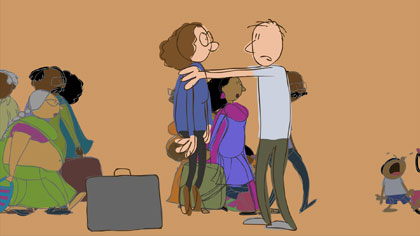“I hereby Give you my word, my solemn promise, that The son born to Satyavati shall be king. I Renounce my right and claim as yuvaraja”
Bhishma's action reflect the core of Hinduism, getting rid of our vanities and connecting more with the spiritual world. Bhishma teaches us about the abounding flaws of humanity and the ways we can rise above them. Bhishma shows us that we can live a fulfilling life if we abandon our mundane habits. It also teaches us that love can blind us and that good deed are always rewarded. CC BY-NC-ND .
 To me the real hero of the story is not Gilgamesh but Inkidu. Gilgamesh full of human vices despite being a demigod. But Inkidu was the reason why Gilgamesh started to live. Gilgamesh would have being nothing without his partner, he would not have suffer in like without Inkidu's death, and would have not turn his life around either. This is why Inkidu is the hero.
CC BY-NC-ND
To me the real hero of the story is not Gilgamesh but Inkidu. Gilgamesh full of human vices despite being a demigod. But Inkidu was the reason why Gilgamesh started to live. Gilgamesh would have being nothing without his partner, he would not have suffer in like without Inkidu's death, and would have not turn his life around either. This is why Inkidu is the hero.
CC BY-NC-ND  At the end of the day, the only hero in the story was Nina herself. Rama was a complete self absorbed jerk and Sita was completely submissive and did not think of her even once. While Nina went through modern similar faces of rejection and self worth, she came to terms with herself, and accepted the fact that her ex boyfriend was not worth her pain and that she had to move on in life.
CC BY-NC-ND
At the end of the day, the only hero in the story was Nina herself. Rama was a complete self absorbed jerk and Sita was completely submissive and did not think of her even once. While Nina went through modern similar faces of rejection and self worth, she came to terms with herself, and accepted the fact that her ex boyfriend was not worth her pain and that she had to move on in life.
CC BY-NC-ND